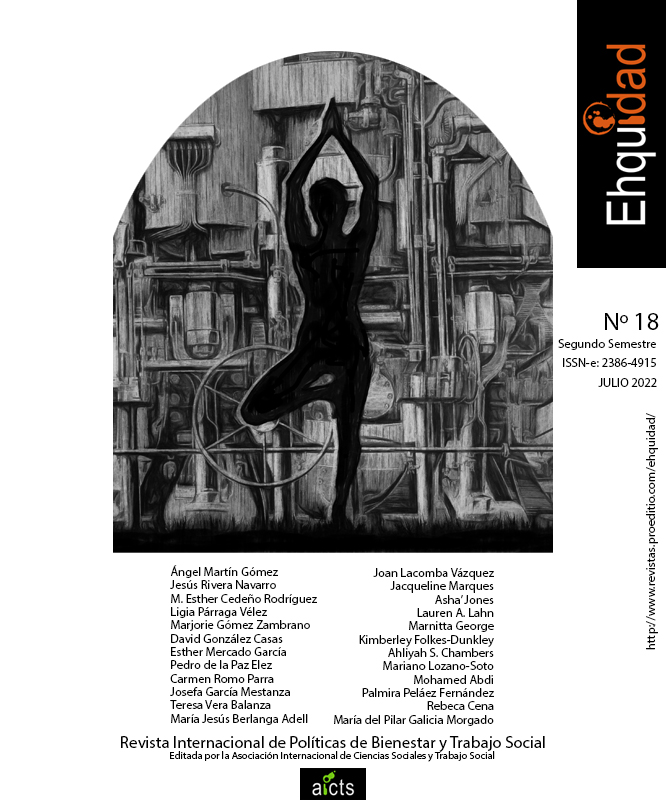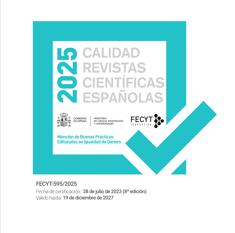Empathic abilities, personal strength and depressive mood in spanish population in time of COVID-19
DOI:
https://doi.org/10.15257/ehquidad.2022.0013Keywords:
COVID-19 Pandemic, Depression, Resilience, Confinement, Empathy, Personal StrengthAbstract
The present research aims to analyze the impact on depressed mood of the confinement decreed by the COVID-19 pandemic, based on empathic capacities and personal strength in Spain. This is a cross-sectional, descriptive and correlational research with quantitative methodology. 2112 people over 18 years of age participated. For the analysis of depressed mood, the CES-D questionnaire was administered and to empathic capacities and personal strength the resilience scale for the study of resilient protective factors. The results of the ANOVA statistic and the linear regression carried out indicate the high degree of association and predictive capacity of the dimensions, empathic capacities and personal strength, with respect to the depressed. In conclusion the depressive mood in the Spanish population during confinement caused by COVID-19 is determined by empathic capacities and personal strength.
Downloads
References
Adhikari, S., Meng, Y., & Wu, Y. e. (2020). Epidemiology, causes, clinical manifestation and diagnosis, prevention and control of coronavirus disease (COVID-19) during the early outbreak period: a scoping review Infect. Dis. Poverty, 17(9). DOI: https://doi.org/10.1186/s40249-020-00646-x https://doi.org/10.1186/s40249-020-00646-x
Albuquerque, C., Almeida, J., Cunha, M., Madureira, A., & Andrade, A. (2015). Factores de resiliencia protectora en adolescentes portugueses institucionalizados. Procedia-Ciencias sociales y del comportamiento , 171, 276-283. URL: http://repositorio.ismt.pt/jspui/handle/123456789/146
Andrades, M., García, F. E., Concha, P., Valiente, C., & Lucero, C. (2021). Predictores de síntomas de ansiedad, depresión y estrés a partir del brote epidémico de COVID-19. Revista de psicopatología y psicología clínica, 26(1), 13-22.
Ausín, B., González-Sanguino, C., Castellanos, M. Á., & Muñoz, M. (2021). Estudio longitudinal de la percepción de soledad durante el confinamiento derivado de la Covid-19 en una muestra de población española. Acción Psicológica, 18(1), 165-178.
Baltar, F., & Brunet, I. (2012). Social research 2.0: virtual snowball sampling method using Facebook.). Internet research, 22(1). DOI: 10.1108/10662241211199960
Baltar, F., & Gorjup, M. (2012). Muestreo mixto online: Una aplicación en poblaciones ocultas. Intangible Capital, 8(1), 123-49. DOI: "http://dx.doi.org/10.3926/ic.294” http://dx.doi.org/10.3926/ic.294
Bao, Y., Sun, S., Meng, J., Shi, & al., e. (2020). 2019-nCoV epidemic: address mental health care to empower society. . The Lancet, 22(395), 37-38. Doi:10.1016/S0140-6736(20)30309-3
Beutel, M., Klein, E., Brähler, E., & al., e. (2017). Loneliness in the general population: Prevalence, determinants and relations to mental health. . BMC Psychiatry, 17(97):, 1-7. DOI:https://doi.org/10.1186/s12888-017-1262-x
Brooks, S., Webster, R., & Smith, L. e. (2020). The psychological impact of quarantine and how to reduce it: rapid review of the evidence. . Lancet, 395, 912-920. DOI:https://doi.org/10.1016/S0140-6736(20)30460-8
Carrillo, J., Collado, S., Rojo, N., & Staats, A. (2006). El papel de las emociones positivas y negativas en la predicción de la depresión: el principio de adicción de las emociones con el conductismo psicológico. Clinica y Salud, 17 (3), 277-295.URL: "https://www.redalyc.org/articulo.oa?id=1806/180613871005"
Chen, Y., Zhou, H., & Zhou, Y. (2020). Prevalence of self-reported depression and anxiety among pediatric medical staff members during the COVID-19 outbreak in Guiyang. China Psychiatry Reserarch, 288, 13005. DOI: https://doi.org/10.1016/j.psychres.2020.113005
de la Paz, P., & Mercado, E. (2018). Elaboración y validación de una escala de resiliencia para el estudio de factores protectores resilientes en población ecuatoriana. Prisma Social, 20, 254-272. URL: https://revistaprismasocial.es/article/view/2344
Díaz, A. L., Prados, J. S., Canos, V. F., & Martínez, A. M. (2020). Impactos del confinamiento por el COVID-19 entre universitarios: Satisfacción Vital, Resiliencia y Capital Social Online. RISE, 9(1),, 79-104. DOI: http://doi.org/10.17583/rise.2020.5925
Escribano, A. I. (2020). Sociología del confinamiento. Documentación social, (5), 4.
Gerst-Emerson, K., & Jayawardhana, J. (2015). Loneliness as a public health issue: The impact of loneliness on health care utilization among older adults. American Journal of Public Health,105(5), 1013-1019. DOI "https://dx.doi.org/10.2105%2FAJPH.2014.302427"
González Casas, D., Mercado García, E., Corchado Castillo, A. I., & De la Paz Elez, P. (2020). COVID-19 y su asociación con síntomas depresivos en población española. Revista Habanera de Ciencias Médicas, 19(5).
Gracia, E., Herrero, J., & Musitu, G. (2002). Evaluación de recursos y estresores psicosociales en la comunidad. . Madrid: Síntesis.
India., U. N. (12 de Mayo de 2020). COVID-19 could leave scars of Mysophobia, depression and OCDs 2020 . URL: https://search.proquest.com/docview/2382000708
Izquierdo, A., & Garcia-Vera, M. (2013). Una revisión desde la perspectiva de la validez de contenido de los cuestionarios, escalas e inventarios autoaplicados más utilizados en España para evaluar la depresión clínica en adultos. Psicopatología clínica, legal y forense, 13, 139-175. URL: https://eprints.ucm.es/36446
Käll, A., Jägholm, S., Hesser, H., & al., e. (2020). Internet-Based Cognitive Behavior Therapy for Loneliness: A Pilot Randomized Controlled Trial. Behavior Therapy ; 5(1), 54-68. DOI: https://doi.org/10.1016/j.beth.2019.05.001
López-Vázquez, E., & Marván, M. L. (2004). Validación de una escala de afrontamiento frente a riesgos extremos. . Salud pública de México, 46(3), 216-221. URL: https://www.researchgate.net/publication/317479593_Validacion_de_una_escala_de_afrontamiento_frente_a_riesgos_extremos
Luthar, S., & Cicchetti, D. (2000). El constructo de resiliencia: implicaciones para las intervenciones y las políticas sociales. . Desarrollo y psicopatología , 12 (4), 857. DOI: https://doi.org/10.1111/1467-8624.00164
Matthews, T., Danese, A., Wertz, C., & al., e. (2016). Social isolation, loneliness and depression in young adulthood: a behavioural genetic análisis. . Social Psychiatry and Psychiatric Epidemiology, 5(3), 339-348. DOI 10.1007/s00127-016-1178-7
Mehra, A., Rani, S., Sahoo, S., & al., e. (2020). A crisis for elderly with mental disorders: Relapse of symptoms due to heightened anxiety due to COVID-19 . Asian Journal of Psychiatry, 18(51), 102114. DOI:https://doi.org/10.1016/j.ajp.2020.102114
NewsRx. (2 de Abril de 2020). Obtenido de Reports from Taipei Medical University Provide New Insights into COVID-19 (People with Suspected COVID-19 Symptoms Were More Likely Depressed and Had Lower Health-Related Quality of Life: The Potential Benefit of Health Literacy). Virus Weekly 202 URL: https://search.proquest.com/docview/2393027141
Ojeda, S., Melillo, A., Grotberg, E. H., & de Paladini, M. A. (2001). Resiliencia. Descubriendo las propias fortalezas. . Buenos Aires: Paidos.
Ozamiz-Etxebarria, N., Dosil-Santamaria, M., Picaza-Gorrochategui, M., & Idoiaga-Mondragon, N. (2020). Niveles de estrés, ansiedad y depresión en la primera fase del brote del COVID-19 en una muestra recogida en el norte de España. . Cadernos de Saude Pública,36. DOI:https://doi.org/10.1590/0102-311X00054020
Páez, D., Arroyo, E., & Fernández, I. (1995). Catástrofes, situaciones de riesgo y factores psicosociales. Mapfre Seguridad, 57, 43-55. URL: https://d1wqtxts1xzle7.cloudfront.net/30199973/articulomapfre.pdf?1353125935
Parrado, A., & León, J. (2020). COVID-19: Factores asociados al malestar emocional y morbilidad psíquica en población española. Rev. Esp Salud Pública, 94. URL: https://www.mscbs.gob.es/en/biblioPublic/publicaciones/recursos_propios/resp/revista_cdrom/VOL94/ORIGINALES/RS94C_202006058.pdf
Pérez-Cea, J. J., de Oña, J. M., & Molina, L. (2020). Vivir el Covid-19 en una Chabola: Resiliencia en Situaciones de Desigualdad Social. . Revista Internacional de Educación para la Justicia Social, 9(3). URL:12111-Texto%20del%20artículo-30711-2-10-20200519%20(1).pdf
Quesada, C. V. (2006). El enfoque de resiliencia en Trabajo Social. Acciones e Investigaciones sociales, (1 Ext), 466-466.
Rajkumar, R. (2020). COVID-19 and mental health: A review of the existing literature. . Asian Journal of Psychiatry, 52, 1-5.DOI: https://doi.org/10.1016/j.ajp.2020.102066
Rodríguez, C. (2020). Cinco retos psicológicos de la crisis del COVID-19. Journal of Negative & No Negative Results, 5(6). DOI: 10.19230/jonnpr.3662
Román, F., Fores, A., Calandri, I.., Gautreaux, R., Antúnez, A., & et.al. (2020). Resiliencia de docentes en distanciamiento social preventivo obligatorio durante la pandemia de COVID-19. . Journal of Neuroeducation, 1(1), 76-87. DOI: https://doi.org/10.1344/joned.v1i1.31727
Rutter, M. (1992). Developing Minds: Challenge and Continuity across the Life Span. Great Britain: Penguin Books.
Saleebey, D. (1996). The strengths perspective in social work practice: Extensions and cautions. Social Work, 4, 296-305.
Saavedra, E. (1997). Variables psicológicas del maltratador infantil, desde el Enfoque Cognitivo Procesal Sistémico. Santiago de Chile: Universidad Católica de Maule.
Sampaio, L. R., de Oliveira, L. C., & Pires, M. F. (2020). Empatia, depressão, ansiedade e estresse em Profissionais de Saúde Brasileiros. Ciencias Psicológicas. DOI: https://doi.org/10.22235/cp.v14i2.2215
Sandín, B., Chorot, P., García-Escalera, J., & Valiente, R. M. (2021). Impacto emocional de la pandemia de COVID-19 durante el periodo de confinamiento en España: Factores protectores y factores de riesgo/vulnerabilidad. Acción Psicológica, 18(1), 27-44.
Santarone, K., McKenney, M., & Elkbuli, A. (2020). Preserving mental health and resilience in frontline healthcare workers during COVID-19. The American journal of emergency medicine. DOI: https://dx.doi.org/10.1016%2Fj.ajem.2020.04.030
Santora, T. (16 de Mayo de 2020). Obtenido de COVID-19 Has Unleashed a Wave of Loneliness, Sadness, and Anxiety. Can Medication Help? Fatherly. Health&Science. URL: https://adaa.org/ [Anxiety and Depression Association of America].
Scheier, M., & Carver, C. (1992). Efectos del optimismo sobre el bienestar psicológico y físico: Panorama teórico y actualización empírica. Investigación y terapia cognitiva , 16 (2), 201-228.
Sharer, R. (2020). Covid-19 and Depression. Clinical Therapeutics. DOI: https://doi.org/10.1016/j.clinthera.2020.04.010
Solano-Gámez, A. (2020). RESILIENCIA Y COVID 19. Revista Colombiana de Obstetricia y Ginecología, 71(1), 7-8. DOI: https://doi.org/10.18597/rcog.3531
Soler, J., Pérez-Sola, V., & Puigdemont, D. (1997). Validation study of the Center for Epidemiological Studies-Depression of a Spanish population of patients with affective disorders. Actas Luso Esp Neurol Psiquiatr Cienc Afines, 25(4):, 243-249. URL: https://pubmed.ncbi.nlm.nih.gov/9412163/
Taylor, M., Kingsley, E., Stevens, G., & al., e. (2008). Factors influencing psychological distress during a disease epidemic: Data from Australia's first outbreak of equine influenza. . BMC Public Health , 338-347. DOI:10.1186/1471-2458-8-347
Vázquez, F., Blanco, V., & López, M. (2007). An adaptation of the Center for Epidemiologic Studies Depression Scale for use in non-psychiatric Spanish populations. . Psyquiatry Research, 149(1-3), 247-52.












